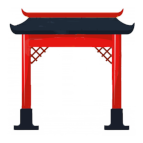| Meaning |

next in sequence 次
|
| Explanation |
|
Used in these characters:
|
|
次
|
 |
|
JLPT HSK 2 |
|
| next in sequence, the second (day, time etc)
|
Left: ice 冫, right: lacking 欠 (showing a person 人 yawning  with mouth wide open, "lacking" good manners) with mouth wide open, "lacking" good manners)
Ice is lacking, what comes next?

|
|
|
|
资
|
 |
|
JLPT HSK 4 |
|
| capital, resources, to provide, money
|
Top: next 次 (ice 冫lacks 欠, what comes next? [欠 = The yawning  person 人 has a lack [of manners]), bottom: money 贝/貝 (= cone-shell 目 with two feelers 八 as shell-money) person 人 has a lack [of manners]), bottom: money 贝/貝 (= cone-shell 目 with two feelers 八 as shell-money)
The next money will be added to the capital.

|
|
|
|
羡
|
 |
|
JLPT HSK 4 |
|
| jealous, to envy, admire
|
Top: sheep 羊, below: next/following 次 (ice 冫is lacking 欠, what comes next?) (欠 = The yawning  person 人 has a lack [of manners]) person 人 has a lack [of manners])
The sheep coming next makes me jealous.

|
|
|
|
姿
|
 |
|
JLPT HSK 5 |
|
| appearance, beauty, disposition, looks
|
Top: next/following 次 (ice 冫is lacking 欠 [yawning person], what comes next?), below: woman 女
My next woman will have a great appearance.

|
|
|
|
咨
|
 |
|
JLPT HSK 5 |
|
| to consult, seek advice
|
Top: next/following 次 (ice 冫is lacking 欠, what comes next?) (欠 = The yawning  person 人 has a lack [of manners]), bottom: mouth 口 person 人 has a lack [of manners]), bottom: mouth 口
Next, use your mouth to consult.

|
|
|
|
瓷
|
 |
|
JLPT HSK 6 |
|
| porcelain, chinaware, china
|
Top: next/following 次 (ice 冫is lacking 欠 [=yawning person], what comes next?), bottom: roof tile 瓦.
The next roof tile is made of porcelain.

|
|
|
|
盗
|
 |
|
JLPT HSK 6 |
|
| to steal, to rob, to plunder, thief
|
Top: next/following 次 (ice 冫is lacking 欠, what comes next?) [to lack 欠 = yawning ⺈ person 人 with mouth wide open, who is lacking good manners], below: plate 皿
We need a next plate, because one was stolen.

|
|
|
|
茨
|
 |
|
JLPT no HSK |
|
| to thatch (a roof), Caltrop or puncture vine
|
Top: plant 艹, below: next/following 次 (ice 冫is lacking 欠 [yawning person], what comes next?)
When a plant is the "next" to each other [= they lie close adjacent], this is a thatched roof.

|
|
|
|
懿
|
 |
|
JLPT no HSK |
|
| virtuous, admirable, esteemed, restrain
|
Top variation of: be happy, enjoy 喜 (A scholar 士 with beans 豆 in his mouth 口 is happy.), right: lack 次, heart 心
He who is happy and has no lack in his heart: virtuous.

|
|
|
|
恣
|
 |
|
JLPT no HSK |
|
| unrestrained, unbridled, to do as one pleases
|
Top: next, following 次 (ice 冫is lacking 欠, what comes next?) - (to lack 欠 = The yawning  person 人 has a lack [of good manners]), bottom: heart 心 person 人 has a lack [of good manners]), bottom: heart 心
Next, the heart will be unrestrained.

|
|
|
| Radicals are shown here that are similar either in appearance or meaning. |  |
|
At the page you get the memory phrases for learning the Chinese Hanzi. If you are learning the Japanese kanji, please follow this link. |
List of the characters |
List of the radicals
|

